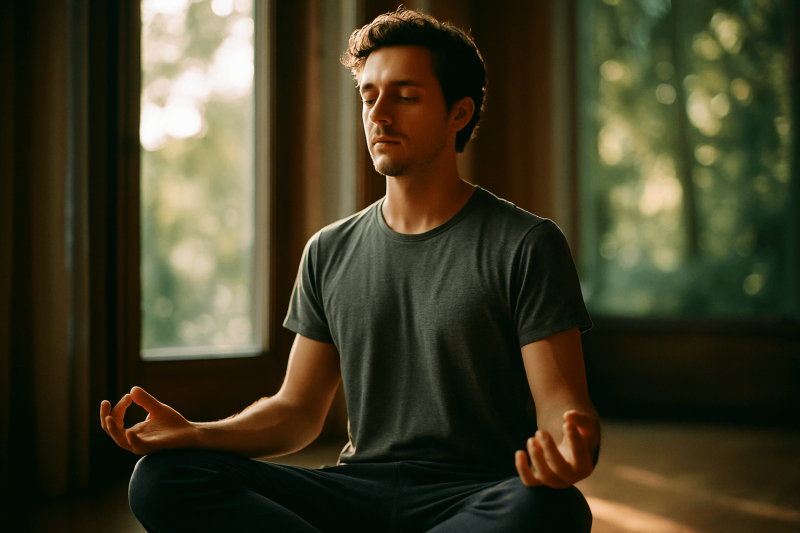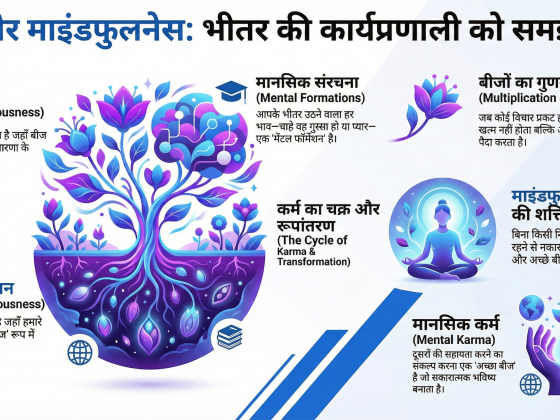Introduction to Meditation and Well Being
- Meditation helps reduce stress and brings inner peace and calm to our well being –
Understanding the meaning of meditation—its purpose to foster present-moment awareness and mindfulness—can help deepen your practice and enhance its benefits. - Practicing meditation even for a few moments can ease anxious and tense feelings – Those who meditate may learn to make better choices and decisions, as the practice encourages clarity and mindfulness.
- Anyone can meditate easily without special equipment or cost to improve their life –
Historically, meditation was meant to help individuals connect with spiritual or mystical forces, while today it is also meant for relaxation, stress reduction, and overall well-being. - Meditation is a mind-body complementary medicine that calms the mind and relaxes the body –
- Focusing on one thing during meditation clears stressful thoughts and improves physical and emotional health
Types of Meditation Practices
- Guided meditation uses mental images and senses to help you relax, often led by a guide – Guided meditations are an excellent tool for beginners, as they provide gentle instruction and support.
- Mindfulness meditation focuses on present awareness, such as noticing breath flow without judgment –
- There are many different meditations and techniques available, each offering unique benefits for achieving inner peace and relaxation –
- Both types encourage mindful focus on feelings, thoughts, and sensations to promote peace. Choosing the right technique can help tailor the meditation experience to your individual needs. –
- Meditation music can be used to enhance the meditation experience and promote calm
Mindfulness Meditation Techniques
- Focus on the sensation of your breath going in and out to practice mindfulness meditation—the point is to use your breath or another anchor to bring your attention back to the present moment.
- Use your breath as an anchor for mindful attention and gently return to it when your mind wanders.
- Mindfulness meditation teaches you to stay centered and maintain inner peace throughout the day.
- Benefits of mindfulness meditation extend beyond sessions and may help manage symptoms of some medical conditions.
- Regular mindfulness meditation practice can increase self-kindness and emotional regulation.
Remember, there is no single way you are supposed to feel or think during mindfulness meditation—accept whatever arises without judgment.
Preparing for Meditation
- Find a calm, quiet place to sit comfortably and prepare for meditation – A quiet setting can help beginners meditate more easily by reducing distractions and promoting focus.
- Choose a spot that helps you feel relaxed and focused, and consider using meditation music –
- Sit in a stable position: chair with feet on the floor, cross-legged, or kneeling, and take a deep breath. As you settle in, relax your chest, belly, and neck, and notice any sensations in these areas –
- Ensure your posture allows you to sit comfortably for a while and breathe naturally –
- Close your eyes and begin to focus on your breath, feeling the air move in and out of your body. Notice the movement of your breath in your chest and belly, and release any tension in your neck.
Using Meditation Music for Relaxation
- Meditation music can help you relax and focus your mind, reducing anxiety and stress – Many people like to listen to calming music while meditating, as it creates a soothing atmosphere.
- Listen to calming music, such as nature sounds or soft instrumental tracks, to enhance your meditation experience –
- Use music to create a peaceful atmosphere and promote relaxation, and consider using it in your daily meditation practice –
- Meditation music can be used in conjunction with guided meditation or mindfulness meditation techniques –
- Find a comfortable place to sit or lie down, and let the music guide you into a state of deep relaxation
Reducing Anxiety with Meditation
- Meditation helps reduce stress and anxiety by promoting relaxation and calm, while also supporting emotional and physical healing –
- Regular meditation practice can lower stress and improve emotional well-being, reducing anxiety and worry. Meditation can also help manage pain by encouraging awareness and acceptance of physical discomfort as part of the healing process –
- Focus on the present moment and let go of worries about the past or future, and gently return to your breath when your mind wanders. Allow your mind and body to rest during meditation for deeper relaxation –
- Use meditation to cope with stress and anxiety, and consider incorporating physical activity, such as walking or yoga, into your practice –
- Take a few moments each day to practice deep breathing and meditation, and notice the positive impact on your mental health
Meditation for Stress Relief
- Meditation is a powerful way to reduce stress and bring calm to both your mind and body.
- By practicing meditation regularly, you can train yourself to focus on the present moment and let go of anxious thoughts.
- Guided meditation offers gentle support, helping you relax and unwind as you listen to a soothing voice or calming meditation music.
- Adding meditation music to your practice can create a peaceful atmosphere, making it easier to relax and feel at ease.
- To begin, find a comfortable and quiet place to sit, close your eyes, and take a few deep breaths, letting your body relax with each exhale.
- Focus your attention on your breath, noticing how the air moves in and out of your body, and allow yourself to settle into the moment.
- If your mind wanders, gently return your focus to your breath, without judgment or worry.
- With regular practice, meditation can help you lower stress, reduce anxiety, and improve your overall sense of well-being.
Building a Meditation Habit
- Start with short sessions of 5 to 10 minutes meditating, and gradually increase the duration as you become more comfortable with meditation – Short meditations of 5 to 10 minutes can be effective for beginners, helping them ease into the practice without feeling overwhelmed.
- Set a regular time and place for meditation, such as first thing in the morning or before bed, and consider using a meditation app or guided meditation –
- Make meditation a part of your daily routine, and prioritize it as a way to improve your mental and emotional well-being. As you build your meditation habit, focus on slowing down your routine or thoughts to foster mindfulness and relaxation –
- Experiment with different types of meditation, such as mindfulness, guided meditation, or walking meditation. You can simply walk mindfully as a form of meditation to find what works best for you –
- Be patient and kind to yourself as you develop your meditation habit, and remember that it’s okay if your mind wanders
Overcoming Common Obstacles
- Don’t worry if your mind wanders during meditation – simply acknowledge the thought and gently return to your breath. As you meditate, notice how your body feels, paying attention to sensations, tension, or relaxation.
- If you find it difficult to sit still, try incorporating physical activity, such as walking or yoga, into your meditation practice –
- Use meditation music or guided meditation to help you stay focused and relaxed –
- Remember that meditation is a process, and it’s okay if you don’t see immediate results. Just like physical muscles, your mental muscles will strengthen with consistent practice.
- Be kind to yourself and acknowledge that it’s normal for the mind to wander, and gently return to your breath without judgment.
If you fall asleep during meditation, simply reawaken gently and return your attention to your practice.
Advanced Meditation Techniques
- Try visualization techniques, such as imagining a peaceful scene or a bright light, to enhance your meditation experience –
- Use meditation to cultivate compassion and kindness towards yourself and others, and consider practicing loving-kindness meditation –
- Experiment with different types of meditation, such as transcendental or movement meditation, to find what works best for you. For those interested in the spiritual aspects, explore sacred meditation practices that draw on sacred texts or music – Recent research shows that advanced meditation techniques can physically change the brain, enhancing emotional regulation and self-compassion through neuroplasticity.
- Incorporate meditation into your daily activities, such as eating or walking, to increase mindfulness and awareness. Meditation can even be done while walking or waiting in line, making it a versatile practice.
- Use meditation to connect with your body and release physical tension, and consider practicing body scan meditation. During a body scan, bring attention to each part of your body, including the toes, sole of the foot, and neck, noticing sensations and promoting relaxation in these areas –
Conclusion and Next Steps
- Meditation is a simple yet effective way to bring more peace, balance, and relaxation into your life.
- Start by setting aside a few moments each day to practice, whether it’s mindfulness meditation, guided meditation, or simply listening to meditation music.
- Find a comfortable place, focus on your breath, and allow yourself to relax, even if just for a short time.
- As you continue, experiment with different techniques to discover what helps you feel most calm and centered.
- Remember, meditation is a journey—be patient with yourself and enjoy the process as you build a habit that supports your well-being.
Final Thoughts on Meditation
- Meditation is more than just a practice—it’s a way to nurture your mind, body, and spirit.
- Taking time to meditate can help you slow down, reflect, and reconnect with yourself, even in the middle of a busy world.
- Whether you use meditation to reduce stress, improve sleep, or simply find a few moments of peace, the benefits can touch every part of your life.
- With kindness and intention, meditation can help you feel more balanced, aware, and compassionate toward yourself and others.
Lasting Benefits of Meditation
- Regular meditation offers lasting benefits for both your mental and physical health.
- Over time, meditation can strengthen your ability to cope with stress, improve your mood, and support better sleep.
- Many people find that meditation helps them feel more resilient, focused, and at ease in daily life.
- As you continue your meditation journey, you may notice greater awareness, reduced tension in your body, and a deeper sense of well-being.
- The positive effects of meditation can grow with practice, helping you maintain balance and peace no matter what life brings.




